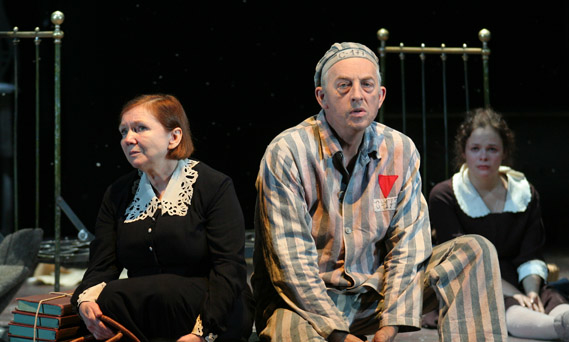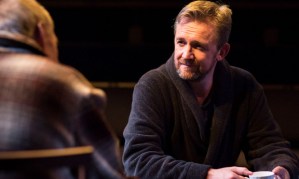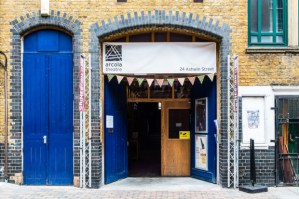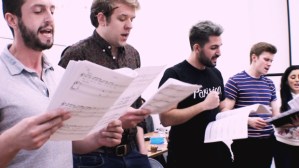Review: Life and Fate (Theatre Royal Haymarket)
St Petersburg’s Maly Theatre Company come to the UK with their award-winning adaptation of Vasily Grossman’s novel

© Maly Drama Theatre
We tend to think that theatre is a universal language. But one of the many things that struck me as I watched this riveting production by the Maly Theatre Company, from St Petersburg, is just how Russian it is.
Its country of origin reveals itself not just in the extraordinary commitment of an ensemble that worked for three years in rehearsal under their legendary director Lev Dodin to bring this adaptation of Vasily Grossman's minatory, epic novel to the stage. It's something too about their generous engagement with the text and the world it conjures and the way that the entire production is willing to grapple over the course of three hours in Russian with English surtitles with the biggest of themes in the most uncompromising manner. You can't tear your eyes away or let your brain switch off for a second.
The work focuses on the extended story of the Jewish Shtrum family, with their physicist paterfamilias Viktor, as they are caught up in the seismic events of the early part of the 20th century, their friends and relations sent without reason to the Gulags filled by Stalin in his purges, or rounded up into the concentration camps of Hitler, as great battles rage across Europe and the Russians hold Stalingrad against the German assault, at enormous cost.
Grossman, a Soviet Jewish journalist who had witnessed both Stalingrad and the liberation of the Treblinka death camp, wrote the book in the 1950s. When he submitted it for publication in 1960, it was suppressed by the KGB; even the typewriter ribbon on which he had written was destroyed and he was told the book could not be published for 200 years. But he had salvaged two copies and sent them to friends. After his death in 1964, the book was smuggled abroad and published in Switzerland in 1980. An edited edition finally appeared in Russia in 1988.
This stage version, originally seen in 2007 and getting its British premiere thanks in part to Roman Abramovich and Leonard Blavatnik among others, keeps the complexity of the book's timeline and shifting scenes. It is sometimes hard for those unfamiliar with the novel (me, for one) to follow every character and each twist of their fate. But the overall thrust is clear: Grossman's point, still brave today, is that the totalitarianism of Hitler and of Stalin were the same, as was their anti-Semitism, and that human freedom, the rights of individuals, should never be sacrificed by a belief in a means justifying an end, or the greater cause.
This point is made symbolically and visually by the setting of Alexey Poray-Koshits. A wire volleyball net diagonally divides the stage, a symbolic barrier easily breached by simple humanity. It also provides the wire fence behind which prisoners on both sides line up, suffering, marching, singing. These scenes blend and meld into the battered domestic setting where the Shtrum family life; everything is both real and dreamlike simultaneously.
In scene after scene, Grossman's celebration of individual humanity and kindness, in a world made mad and cruel by powerful beliefs, is revealed in moments of great theatrical vitality. In one, Shtrum, disgraced and in danger of losing his job at the scientific institute because he refuses to give up his belief in Einsteinian theoretical physics (seen to contradict the materialist view of nature propounded by Lenin), receives a phone call from Stalin. In Sergey Kuryshev's marvellously gentle, baffled, concentrated performance, every emotion passes across his face and body, from a spasm of fear to a delighted, eye-reaching, smile. As he endlessly and disbelievingly repeats to his wife (Elena Solomonova, watchful, wonderful) Stalin's praise – "I wish you success in your work" – he dances across the stage, strips off his pyjamas and jumps into bed with her. As they lie there, wrapped in rapturous embrace at their survival, they are surrounded by the inmates of a German concentration camp in the Ukraine, where a committed old Bolshevik (Igor Ivanov, extraordinary) talks to his Gestapo guard Liss, who makes the chilling point that the systems to which they are both committed are ultimately the same. Both men are monsters, mirror images of each other. "Nationalism is the driving force of the 20th century," says Liss, a phrase that has horrible, chilling echoes today.
Those long, dialectical debates cause a frisson around the theatre. So do simpler moments such as the one where the tank commander Novikov (charismatic Sergey Vlasov) delays an attack in Stalingrad by eight-minutes to stop his forces being wiped out. It's a scene of massive comic brio, with shouted messages down many phones, but its consequences are chilling. His decision may have saved the city but in the madness of Stalin's rule, it seals his fate because he goes against his political masters.
Themes run through the piece like a song; the sudden discovery of your Jewishness, or your Russianness in extreme circumstances; simple acts of kindness or principle; the way everyone's conformity is constantly under pressure; the flaws in good people. It is literally bound together by a lament, by Anna Shtrum's keening farewell letter to her son as she is captured by the Germans and forced first into the ghetto and then to her death.
Tatiana Shestakova plays her like a gentle child, reducing many of the audience to tears. Like Kuryshev, she has been with the Maly for more than 30 years. The entire ensemble is bound together by a uniformity of training, of thought, of intent that is at once supremely naturalistic and carefully choreographed. They are wonderful and under Dodin's careful, magisterial control, create a night of theatre that is never easy but is thrilling in its complexity and reach. I know it is one I will never forget.




















